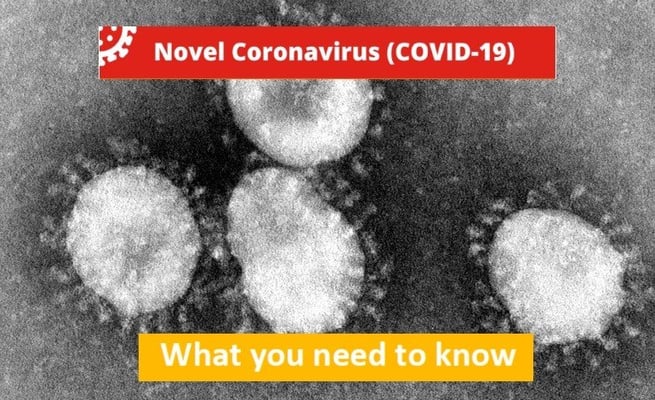Novel Coronavirus (COVID-19): What you need to know

Coronaviruses are a large family of viruses that cause illness ranging from the common cold to more severe diseases like Middle East Respiratory Syndrome (MERS) and Severe Acute Respiratory Syndrome (SARS).
2019 novel coronavirus (COVID-19) is a new strain of coronavirus that hasn’t previously been identified in humans. It emerged out of Wuhan city, Hubei Province, China, in late 2019.
What do we know so far:
There are currently no confirmed cases of COVID-19 in New Zealand but the likelihood of a case coming into New Zealand is high. The likelihood of an outbreak in New Zealand is low and the Ministry of Health is monitoring the situation closely.
For the latest number of cases in China and other countries, visit the World Health Organization’s (WHO’s) Novel Coronavirus webpage and click on Situation Reports Or view, WHO’s map showing countries with confirmed cases. WHO’s Novel Coronavirus webpage can also be viewed in Chinese.
?Q&As
What are the symptoms of 2019 novel coronavirus (COVID-19)?
The symptoms of COVID-19 are similar to a range of other respiratory illnesses, such as influenza (‘flu’). They include fever, cough and difficulty breathing. Difficulty breathing is a sign of possible pneumonia and requires immediate medical attention.
What is the treatment for the 2019 novel coronavirus?
There is no specific treatment for the disease caused by COVID-19. However, many of the symptoms can be treated based on the person’s clinical condition (breathing support for people with breathing difficulties, for example). As this is a new virus, there is currently no vaccine available.
Who is more likely to get the coronavirus?
People of all ages are being infected, but older people and those with medical conditions seem most likely to get seriously ill.
What should I do if I’m feeling unwell?
If you are feeling unwell with minor symptoms, call your local doctor or call the dedicated coronavirus line:
0800 358 5453 (or +64 9 358 5453 for international SIMS) for advice. Interpreters are available.
If you are feeling unwell with severe symptoms, such as difficulty breathing, seek medical attention urgently. Call ahead and mention your travel history.
What can you do to protect yourself, your family and the community?
We can all play a part in helping keep ourselves and others well. The most important action is to practice good respiratory (cough, sneeze) and hand hygiene.
For more information:
New Zealand Ministry of Health
World Health Organisation (English)
World Health Organization (Chinese)
Auckland Regional Public Health Service
Content Supplied: Ministry of Health (NZ), Northland District Health Borad, Waitemata District Health Board, Auckland District Health Board and Counties Manukau Health
Coronaviruses are a large family of viruses that cause illness ranging from the common cold to more severe diseases like Middle East Respiratory Syndrome (MERS) and Severe Acute Respiratory Syndrome (SARS).
2019 novel coronavirus (COVID-19) is a new strain of coronavirus that hasn’t previously...
Coronaviruses are a large family of viruses that cause illness ranging from the common cold to more severe diseases like Middle East Respiratory Syndrome (MERS) and Severe Acute Respiratory Syndrome (SARS).
2019 novel coronavirus (COVID-19) is a new strain of coronavirus that hasn’t previously been identified in humans. It emerged out of Wuhan city, Hubei Province, China, in late 2019.
What do we know so far:
There are currently no confirmed cases of COVID-19 in New Zealand but the likelihood of a case coming into New Zealand is high. The likelihood of an outbreak in New Zealand is low and the Ministry of Health is monitoring the situation closely.
For the latest number of cases in China and other countries, visit the World Health Organization’s (WHO’s) Novel Coronavirus webpage and click on Situation Reports Or view, WHO’s map showing countries with confirmed cases. WHO’s Novel Coronavirus webpage can also be viewed in Chinese.
?Q&As
What are the symptoms of 2019 novel coronavirus (COVID-19)?
The symptoms of COVID-19 are similar to a range of other respiratory illnesses, such as influenza (‘flu’). They include fever, cough and difficulty breathing. Difficulty breathing is a sign of possible pneumonia and requires immediate medical attention.
What is the treatment for the 2019 novel coronavirus?
There is no specific treatment for the disease caused by COVID-19. However, many of the symptoms can be treated based on the person’s clinical condition (breathing support for people with breathing difficulties, for example). As this is a new virus, there is currently no vaccine available.
Who is more likely to get the coronavirus?
People of all ages are being infected, but older people and those with medical conditions seem most likely to get seriously ill.
What should I do if I’m feeling unwell?
If you are feeling unwell with minor symptoms, call your local doctor or call the dedicated coronavirus line:
0800 358 5453 (or +64 9 358 5453 for international SIMS) for advice. Interpreters are available.
If you are feeling unwell with severe symptoms, such as difficulty breathing, seek medical attention urgently. Call ahead and mention your travel history.
What can you do to protect yourself, your family and the community?
We can all play a part in helping keep ourselves and others well. The most important action is to practice good respiratory (cough, sneeze) and hand hygiene.









Leave a Comment